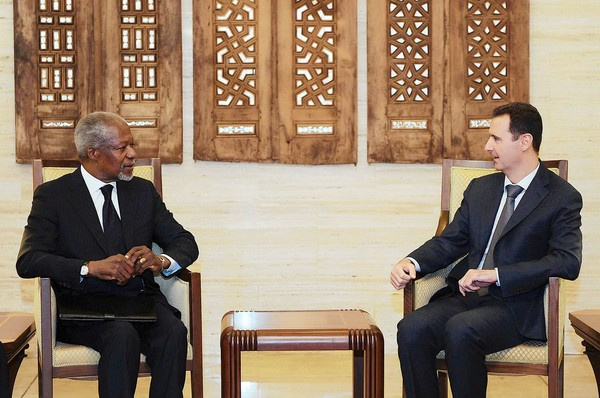Syria and the prospect of Annan’s Plan

On the other hand, after several weeks, only 16 observers have been able to enter Syria, an indication of the unsuccessful nature of this process. General Robert Mood, commander of the observing delegation who yesterday entered Syria, while expressing concerns over cases of violation of the cease-fire and terrorist attacks, stated that the low number of observers is disappointing and at least 100 observers are needed to do the job properly. Considering the limitations, it cannot be said who is violating the cease- fire and whether the government is fulfilling its commitments or not. This task requires a greater presence of observers and more commitment from the opposing parties.
Therefore, the key point is that if conditions are to improve, considerable steps must be taken to enforce this plan. Right now, this plan faces difficulties. The reason is that the government of Syria is worried that if it does not suppress the opposition and gives permission to them to hold demonstrations, people will pour into the streets and the situation will lead in a direction as in other Arab countries such as Egypt, Tunisia, and Libya.
Conditions of the opposition
The opposition has enjoyed regional and international support, which by itself is progress. They have been able to reach certain agreements among themselves over main issues and define targets to reach them. But still the issue of the opposition in Syria is one of the serious questions, even for supporters of these groups, meaning that although serious measures were taken, their situation is not very clear, even for their supporters. Several conferences entitled “Friends of the Syrian People” were held, the last of which was held in Istanbul. In this conference, participating countries officially recognized the “National Council of Syria”, in which different groups in opposition to Bashar Assad’s regime are present, as the “legitimate representative of the people of Syria”. Plans and programs have certainly been proposed in these conferences and they should have organized support for the opposition in Syria, the impacts of which can be seen now. All this support will not lead to removal of concerns over Syria’s opposition. Some are worried that in the case of a collapse of Assad’s regime, problems will still continue, meaning that the opposition has not been able to remove the concerns of the international community regarding the situation after Bashar Assad.
This characteristic has caused the government of Syria to assume that by taking advantage of this situation, it can control the crisis. Therefore, there exists a dual movement, one an international movement towards regime change in Syria, and the other, the government’s movement to return the situation to its past. Although, it seems that both sides are facing serious problems to reach their goals.
Syria’s return to point zero?
In my view, based on many reasons, including the killing of thousands of people, arrests of tens of thousands, bombing civilian targets, etc., by the Syrian government, controlling the situation and returning to the pre-crisis condition is impossible. The violence of the past year, committed by Bashar Assad, has reached a point where the possibility of peaceful resolution of the crisis does not exist. Therefore, in my view, returning to the past conditions in Syria is impossible, and the government of Bashar Assad will not be able to reach the pre-crisis point through suppression of people, meaning that conditions will not be provided for him to rule like the past and continue his previous behavior without facing any problem. Neither internal nor regional capacity exists to tolerate past conditions. For important sections of the territory of Syria is now not under the total control of the Syrian government and it seems that in many regions either government rule does not exist or does not exist in any serious way. Similarly, all Arab countries in the region oppose the continuation of Bashar Assad’s regime. This is important because Syria is not only an Arab country, but also all its aspects are identified by Arabic suffixes. This is while almost all Arab countries have turned their backs on it and support the opposition. There are even reports that some of them have given military and financial aid to the opposition.
Beside Arab countries, relations of the government of Syria with Turkey, its northern neighbor, have severely been damaged and Turkey has become a center for the activities of Syria’s opposition.
On the international level, we see that great efforts are made to overthrow Bashar Assad; particularly powerful governments of the world have taken serious decisions in this direction. Under this condition, it seems that returning to the pre-crisis situation would be impossible. But what will happen in Syria in the coming months depends on the outcome of Annan’s plan. Based on current events, there does not seem to be a clear perspective of the success of this plan. Naturally, if Annan’s plan is defeated, then conditions may become more violent and common concern regarding civil war will be more serious. And in this case, the United Nations Security Council and regional forces will take more serious measures to deal with Bashar Assad and its Ba’athist government.

